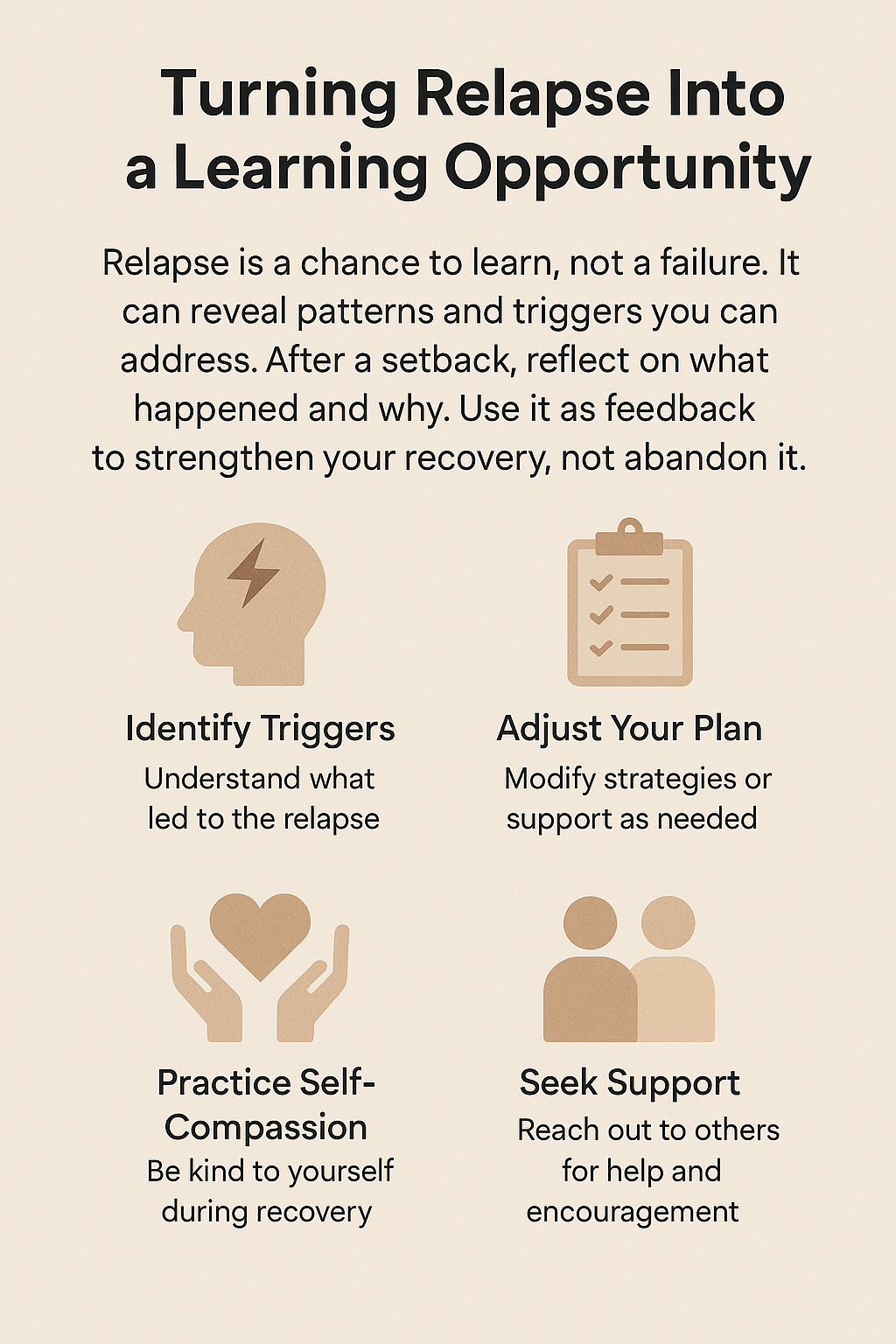Hitting a rough patch in recovery and experiencing a relapse can really shake your confidence, but it doesn’t mean the progress you’ve made is erased. Recovery is a personal adventure, and there’s no single straight path. I want to talk about how a relapse can actually offer you some valuable lessons about your own needs and triggers. Instead of seeing it as a step backward, it can help you prepare even better for the road ahead.
Understanding Relapse: Recovery Isn’t Linear
Relapse often gets framed as a sign that recovery has failed, but it’s much more common—and much less permanent—than many people think. Trying to give up a substance, behavior, or habit is tough, and research shows that setbacks aren’t rare. For example, studies on addiction recovery often report that around 40-60% of people experience relapse at some point.
When I look at my own experiences and those of friends in recovery, it’s clear that most people face obstacles that don’t follow a tidy timeline. There are ups, downs, and a lot of inbetweens. Viewing recovery as a one-way success story can actually make those stumbles feel heavier than they need to. Recognizing that relapse can be a setback, rather than the end of the road, is a beneficial mindset shift.
Why Relapse Happens: The Science and the Triggers
It’s helpful to understand why relapse occurs. Recovery isn’t just about making a decision and sticking with it; there are fundamental physical, emotional, and environmental factors that play a role.
- Biological Factors: Many substances or behaviors actually change brain chemistry, which can make cravings feel overwhelming. That’s not just a lack of willpower. There’s science behind those urges.
- Triggers: Stress, certain social situations, boredom, or even specific places and people can spark the urge to revert to old habits. I noticed that certain times of day or stressful deadlines would make me more vulnerable, and recognizing these patterns helped a lot.
- Emotional Health: Anxiety, depression, or low self-esteem can push someone to seek comfort in what they’re trying to avoid. Addressing these underlying emotions is super important.
Instead of blaming yourself for relapse, understanding these influences can direct your attention to what really needs support. Sometimes it’s about more than just the behavior—it’s about what’s going on underneath the surface.
Learning From Relapse: Turning Setbacks Into Insight
Every recovery adventure is unique, but I’ve found some practical ways to make the most of a relapse for growth.
- Identify Triggers: What was happening before the relapse? Were there any stressors or specific individuals involved? Noticing these details turns each experience into a custom roadmap for the future.
- Assess Your Recovery Plan: Sometimes, relapse points to holes in the plan. Maybe there wasn’t enough support, or daily habits got off track. Adjusting the plan based on real-life feedback makes the next attempt more tailored to your needs.
- Reflect Without Judgment: Criticizing yourself rarely leads to productive outcomes. Taking an honest look without blame helps you learn, not just regret.
- Reach Out for Support: I talk to trusted friends, a counselor, or a recovery group. Honest conversations help put things in perspective, and sometimes just knowing you’re not alone lifts a considerable weight.
Practical Steps to Bounce Back After Relapse
- Acknowledge the Relapse: Admitting to yourself that it happened helps you move forward rather than stay stuck in denial. Facing reality, even when it’s uncomfortable, is the first move toward progress.
- Re-engage with Support Systems: Let others know what happened if you have people you trust. Talking it through can change how you see it and give you ideas you hadn’t considered.
- Update Your Recovery Toolkit: Perhaps now you realize that acquiring extra coping skills, scheduling regular check-ins, or engaging in more activities during challenging times of day can be beneficial. Relapse can highlight gaps you didn’t know about until now.
- Look for Patterns: Keeping a journal about cravings, stress, and mood helped me see things clearly over time. These notes double as an early warning system for the next time things get tough.
- Celebrate Small Wins: Every day that you keep trying counts. It’s worth recognizing the effort even when things don’t go perfectly.
Common Misconceptions About Relapse
Some myths around relapse can make it even harder to shake off shame and try again. Here are a few misconceptions I hear often:
- “Relapse means I can’t recover.” Actually, many people experience relapse multiple times before long-term recovery sticks. The adventure looks different for everyone.
- “All progress is lost.” The effort, time, and skills you’ve built aren’t erased. Each attempt teaches you something new and builds resilience.
- “It’s a sign of weakness.” Recovery requires a great deal of courage and effort. Slipping up doesn’t mean you lack strength; it just means you need more practice and support.
What to Think About After a Relapse
After a setback, taking some time to reflect helps more than jumping back in without making any changes. Recovery is personal, and what worked before might need tweaking. Here are some things to think about:
- Was anything different this time compared to when things were going well?
- Are there people, places, or feelings I haven’t noticed before that make it harder?
- What coping tools helped, even if they only worked for a little while?
- Are there new resources or types of support I can try?
Emotional Care During Recovery
Relapse can really drain your motivation, but giving yourself patience and kindness is super important. It’s easy to fall into self-criticism, but practicing self-compassion makes it easier to keep going. If you have a therapist or support group, sharing your struggles can provide relief and remind you of your progress.
Adjusting Your Plan
The best recovery plans grow with you. As you notice what triggers you or what makes you feel stronger, update your strategy. Whether that means therapy, adopting new routines, forming different social circles, or taking up new hobbies, being flexible helps keep the helpful plan in place.
Real-World Examples: How People Grow from Relapse
I’ve seen a lot of people use relapse as a turning point. I met someone at a support group who realized after a relapse that their stress management tools weren’t enough during the holidays. After discussing with the group, they incorporated additional mindfulness practices and family check-ins into their routine. By the next tough moment, they felt way more prepared.
This kind of adjustment is why relapse can be a valid checkpoint rather than a final stop. Knowing that setbacks are common and even expected helps alleviate the sting of having to start again.
- Learning About Boundaries: Some individuals discover that certain friendships or environments require adjustments after relapse. This awareness can help keep future progress on track.
- More Realistic Expectations: Relapse can help people transition from perfectionism to patience—a mindset where persistence takes precedence over achieving flawless results on the first try.
Frequently Asked Questions About Relapse and Recovery
Here are some everyday things people wonder about relapse during recovery:
Question: If I relapse, will I ever really recover?
Answer: Recovery isn’t a one-shot deal. Many people encounter several setbacks before achieving their goals. Each try builds up experience and resilience.
Question: Are there ways to prevent relapse?
Answer: There’s no perfect formula, but understanding your triggers, having strong support, and being proactive with stress management can all make it less likely. Even then, staying flexible is helpful because plans sometimes need tweaks.
Question: How do I talk to others about my relapse?
Answer: It helps to be honest and direct if you feel comfortable. Trusted friends, family, or support group members can offer empathy instead of judgment. Sharing can also help others who face similar challenges.
Moving Forward and Building Strength
Everyone’s road to recovery is unique. A relapse doesn’t erase the work you’ve done. It’s just another data point that helps you grow. The important thing is to stay connected, keep your mind open to new approaches, and show yourself some patience. Over time, setbacks tend to teach you more about what you need, and that knowledge makes each new effort stronger and more personal. Use every part of your adventure—even the rough parts—to build a recovery plan that fits who you are and what you want for your future.
Video: The TRUTH About Relapse in Recovery

